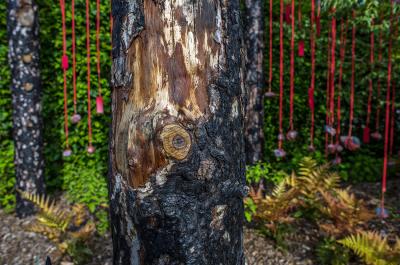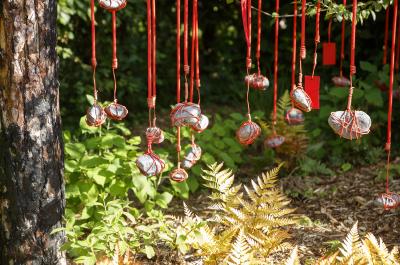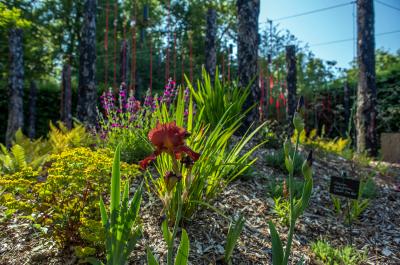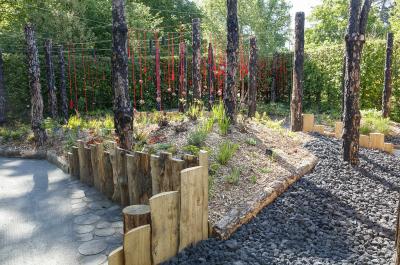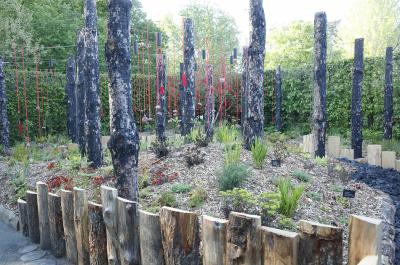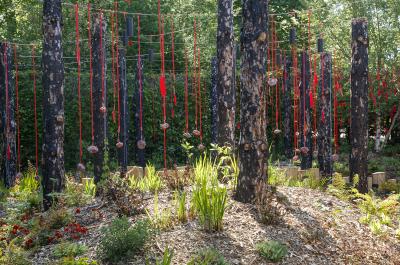23. L’arbre de vie
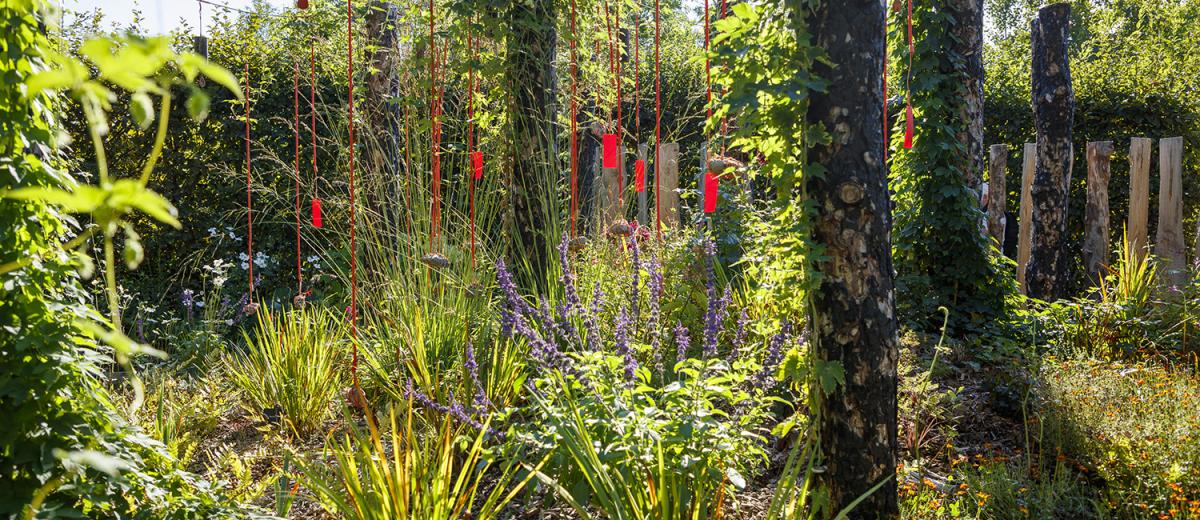
Following the traumatic fire event in the Landes Forest during summer 2022, the first part of this garden stages the sufferings of the ravaged forest and its heavily impacted biodiversity. Behind this dark curtain, though, the forest is gradually raised from its ashes. At the feet of the charred pine trunks that crisscross the area, a diverse range of plant life covers the topography with ever greater density: ferns, hydrangeas, anemones and digitalis flourish alongside silver candles and perennials with chocolate brown leaves. The garden can also be interpreted vertically, with the climbing plants and coloured threads that lead to “the Tree of Life”, a birch tree known for its longevity and resistance.
Running between its unique living outline and the shadows cast by the burnt trunks, threads weave a canopy composed of hundreds of pieces of coloured fabric that stir in the breeze to the music of wind chimes. They carry messages of hope, philosophical and scientific lessons, to protect this garden forest. Thanks to the tree of life’s symbiosis with the surrounding ecosystem, the forest’s rebirth is underway, calling humanity’s role in the process into question along the way.
DESIGNERS
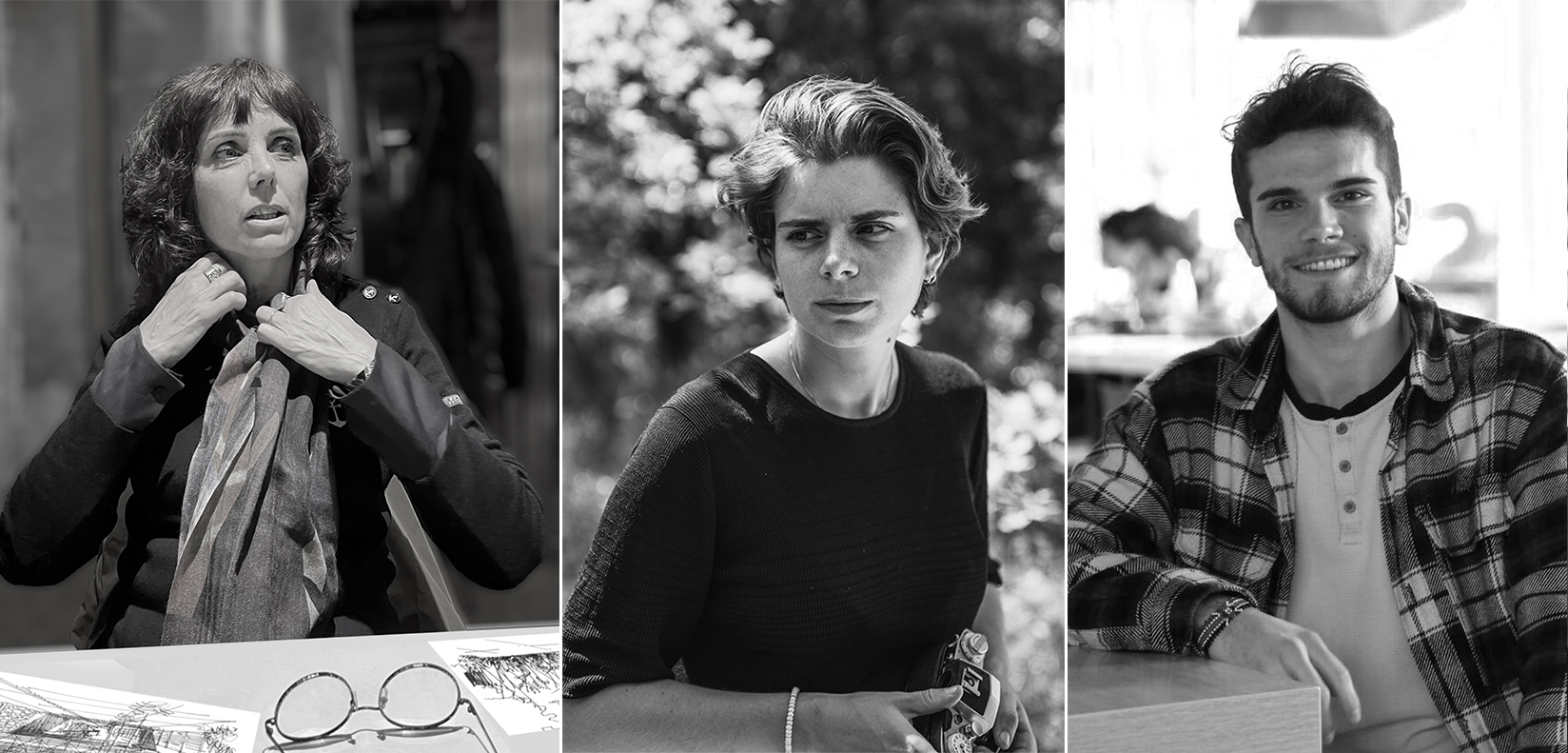
A graduate of the National Higher School of Architecture (ENSA) in Toulouse and the National Higher School of Landscape (ENSP) in Versailles, Laurence Aurejac puts her dual skills to good use at Studio AR. She participates in large- and small-scale projects alike, on a wide range of sites and environments confronted with our present-day changes, whether natural, built heritage, rural or urban. In parallel to this activity, she teaches at Bordeaux’s School of Architecture and Landscape and the University of Bordeaux-Montaigne in the Urban Planning department. Her commitment to landscape was confirmed by the year (1994 / 1995) she was lucky enough to work with Gilles Clément, participating in a variety of projects including landscaping the Grand Axe de la Défense, the 1939 Olympic Village in Berlin, the hill and urban park in Besançon’s Planoise neighbourhood, and collaborating on a test garden prefiguring the Gardens of the Arche de la Défense. Working alongside him, she discovered a special vocabulary, a way of looking at the sites involved and a richly different way of thinking, attentive to dynamic natural landscapes where species and genera could flourish. That year was a wonderful interlude that committed her still more to landscaping. Later, she joined Aurba, Bordeaux-Aquitaine’s urban planning agency, a strategic tool for development of Girondin and Aquitanian territories, where, among other things, she worked on the question of mobility in the metropolitan landscape. Since 2017, her activity as a landscape designer has combined large-scale territorial and garden projects for heritage sites in France and elsewhere. Benefiting from the range of viewpoints provided by other disciplines and the teamwork required for creation of gardens, she tackles contrasting missions, all of them rewarding experiences, combining sensory with rational, methodical with poetic, and always putting herself at the service of the site and its characteristics, taking full account of human beings’ impact on their natural environment.
After graduating from the National Higher School of Architecture (ENSA) in Versailles in 2022, Rachel Rouzaud now works for Studio AR. In parallel to this activity, she teaches at Versailles ENSA and practices as an artist. Inspired by her study visits to China and Japan, she is interested in codes of representation, more specifically in new ways of communicating architectural projects through production of hybrid objects. She produces carpets, artistic domestic mediums for the forging of links between histories, cultures and disciplines, making architecture accessible in another way. Her carpets depict a variety of worlds. Flat landscapes attached end-to-end (as for the ASAP exhibition in Nantes), fantastical, highly colourful urban landscapes, mediums for depictions of architecture, ephemeral objects designed to decompose little by little... During her placement at the Dogma agency in Brussels, she took part in the 17th edition of the Venice Architecture Biennale. Her degree project, carried out in tandem with Marie Saracco, consisted of the renovation – in 4 months and full-scale – of small houses, known as mazets, in the forest, using environmentally friendly materials. The project won the Maison de l’Architecture d’Île-de-France’s 2022 Graduates Prize.
A student in his last year at ISTOM, an engineering school in Angers specialising in international agro-development and humanitarian actions, Jean-Cosme Rouzaud has opted for the Agricultural Development and Funding (DEV) speciality. He has been to several countries and tested out various research protocols during his placements. In Kenya, Togo, Guinea-Conakry with the Nutriset Group on the research project on varietal selection of peanuts according to nutritional profiles (VAMP), and in Cambodia with CIRAD, the French Agricultural Research Centre for International Development, on the Santés et Territoires project, in order to identify the most suitable area for carrying out the “One Health” research/action project on the consequences that agroecological practices have on health. He is the creator and organiser of the “Backstage” competition, which promotes artistic expression by students at several engineering schools, with exhibitions held in Angers and Rouen. He also organised an exhibition of photographs by fellow students in the context of the Erasmus programme. He produces interview podcasts providing information on the most environmentally friendly practices and better knowledge of actions carried out abroad. He has prepared and facilitated conferences on the cacao sector and on Syrian Kurdistan. As President of the Humanistom student association, he initiated and created a library in Togo for children and adults.

